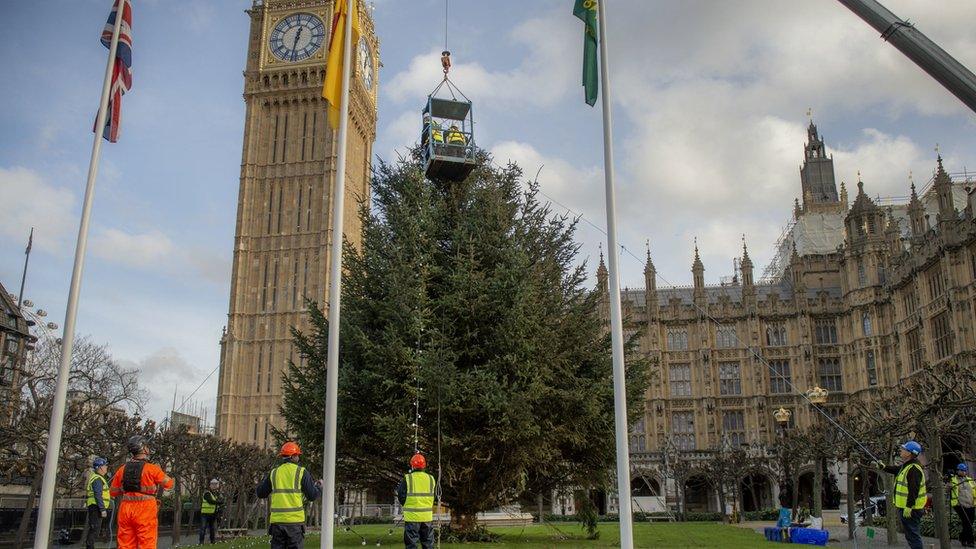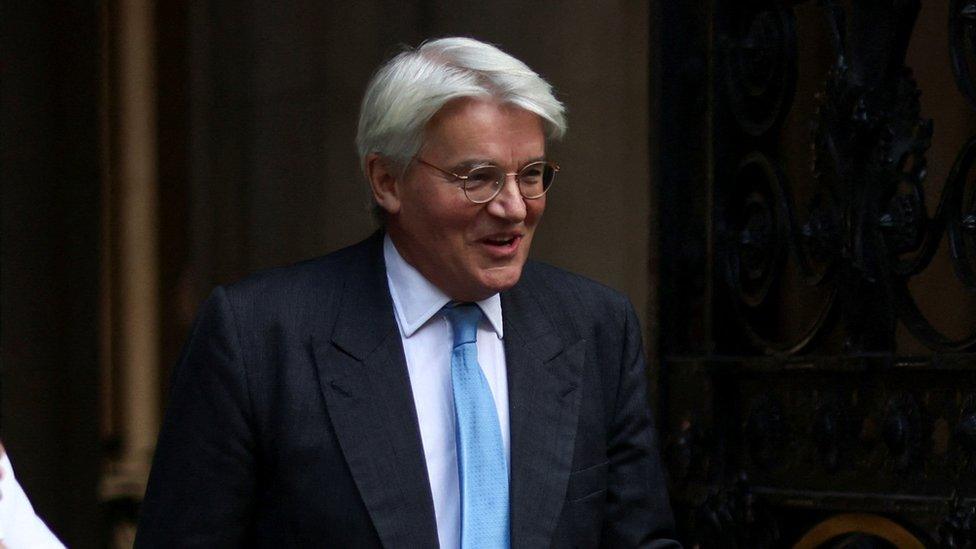What's happening in Parliament next week?
- Published

It's a week of heavy-duty legislating - with a major new law to regulate the internet and a fast-track bill on Northern Ireland, plus some serious scrutiny work, all with a changing cast of characters.
Four new secretaries of state face the Commons select committees charged with keeping an eye on them (some of which have new chairs).
The SNP will also select a new Westminster leader to succeed Ian Blackford, who has announced he is standing down from the role.
The 2019-intaker Stephen Flynn is hotly tipped (ahead of more experienced figures, interestingly) for an unopposed coronation at their Westminster group's AGM on Tuesday. The new leader will go straight into battle at PMQs the following morning.
Samantha Dixon, a former local council leader, will take her seat as the new Labour MP for the City of Chester, after Thursday's by-election. Six more peers will also take their seats in the increasingly swollen House of Lords.
Elsewhere, there's an important speech from Gareth Davies, the head of the National Audit Office, the UK's independent public spending watchdog, who will be looking at ways to improve value for money from public spending. Will ministers be there, taking notes?
Monday 5 December
Commons: (14:30) Work and Pensions Questions, doubtless followed by the usual post-weekend government statements and urgent questions.
Main debate: MPs will go through the remaining Stages of the Online Safety Bill. It looks as if there will be a debate on one group of amendments, and then MPs will spend an hour sending the bill back into committee stage, where they will integrate a series of vast government amendments into the text. It will then have to come back to the Commons for a further bout of report stage, where any number of issues relating to "legal but harmful" content and anti-fraud measures will be fought out, before, finally, it is sent off to the Lords.
All this will have to happen pretty rapidly, because peers will need quite a while to digest this vast and ground-breaking measure. Some say they will need about ten weeks. If the process takes too long, the whole thing could be lost - it won't be possible, under current rules, to "carry over" the current bill into the next parliamentary year, which is expected to begin in May. Tick, tock...
Westminster Hall: The Petitions Committee will debate a petition calling on the government to find the time to pass the Kept Animals Bill, which bans the export of livestock for slaughter and fattening, tackles puppy imports, and bans keeping primates as domestic pets in England.
Lords: (14:00) Two new Conservative peers take their seats: economist Baroness Moyo, and Baroness Lampard, who chaired a Department of Health investigation into how Jimmy Savile was given extensive access to three NHS hospitals. Then, peers rush through the Northern Ireland Executive (Formation etc) Bill, which postpones elections to the Northern Ireland Assembly.

The Kept Animals Bill would place additional restrictions on the importing of puppies
Tuesday 6 December
Commons: Health ministers take questions from 11:30.
Ten Minute Rule Bill: The SNP's Steve Bonnar wants to update employment rights in the gig economy - including a right to request more predictable terms and conditions.
There's rumoured to be a government statement coming on compensation for victims of the Post Office Horizon scandal, where hundreds of sub-postmasters were wrongly convicted of fraud because of faults in a computer system.
Main debate: It's a Labour Opposition Day, on a subject to be announced.
Committees: Environment, Food and Rural Affairs (14:00) has a general session new Secretary of State Therese Coffey. They have much to discuss, not least the avian flu outbreak. Defence Secretary Ben Wallace will appear before the Scottish Affairs Committee (14:30) to discuss shipbuilding for the Navy. Digital, Culture Media and Sport (14:30) meets new Secretary of State Michelle Donelan.
The encounter (14:30) between the International Development Committee and new aid minister Andrew Mitchell should have a déjà vu flavour; Mr Mitchell was Secretary of State back in the days before the Department for International Development was absorbed by the Foreign Office, and was a strong critic of the decision to scale back the UK's aid spending. He will doubtless be quizzed on whether the cost of looking after refugees in the UK should count towards the UK's now reduced international aid commitment.

Former overseas aid spending rebel Andrew Mitchell is back in government under Rishi Sunak
Lords: (14:30) Second Reading of the National Security Bill - the speakers list includes former head of MI5 Lady Manningham Buller, and former MI6 officer Lady Ramsay of Cartvale, plus former National Security Advisor and Chair of the Joint Intelligence Committee, Lord Ricketts. So plenty of expertise there. In the Commons, there was some debate around the so-called "007 clause" authorising illegal activities abroad, and whether it gave carte blanche for activities like extraordinary rendition of terror suspects to countries where they might be tortured. Watch out, too, for amendments directed at China, after crossbencher Lord Alton's successful intervention against Chinese-made CCTV systems in the Procurement Bill this week.
Wednesday 7 December
Commons: (11:30) Questions to Attorney-General Victoria Prentice, followed at noon by Prime Minister's Questions, probably featuring the debut of the new SNP Westminster leader.
Ten Minute Rule Bill: Conservative Robbie Moore continues his campaign to extract his Keighley constituency from the City of Bradford, with a bill to allow local council boundaries to be changed where there is public support.
Main Debate: Report stage and third reading of the Financial Services and Markets Bill.
Westminster Hall: Labour's Kevin Brennan (11:00) has a debate on remuneration for songwriters and composers - continuing his long-running campaign to improve the rewards musicians and composers receive from streaming services; he'll also be looking at buy-outs of rights and the impact of AI.
Committees: Education (09:30) has its first meeting with new Education Secretary Gillian Keegan, and Transport (09:30) meets incoming Transport Secretary Mark Harper - expect an update on the rail strikes. Meanwhile, Home Affairs (09:45) has a session on migration and asylum, starring Albanian ambassador Qirjako Qirko.
Lords: (15:00) Report Stage on the Higher Education (Freedom of Speech) Bill. Watch out for a Labour amendment to remove the right to sue universities for deprivation of freedom of speech (they argue such rights already exist).
Thursday 8 December
Commons: (09:30) Cabinet Office questions - featuring ministers Oliver Dowden, Nadhim Zahawi, Jeremy Quinn and Jonny Mercer, the veterans affairs minister.
The main debates are on cancer services, following a report from the Health and Social Care Committee, and on a backbench motion on cuts to BBC local radio, from the Conservative ex-minister Mike Penning.
Lords: (11:00) Two more new peers arrive: Lord Jackson of Peterborough, the former Conservative MP Stewart Jackson, and Lady Anderson of Stoke on Trent, the former Labour MP, Ruth Smeeth. There will be three backbench debates: on the arts and creative industries, on the recent review into the culture of the London Fire Brigade, and on the independent review of children's social care.
Friday 9 December
Commons: (09:30) Second Reading debates on more private members bills - bills proposed by individual MPs - starting with Conservative, former cabinet minister Greg Clark's Protection from Sex-based Harassment in Public Bill which aims to outlaw harassment of women and girls in public. It would make it a criminal offence to follow and intimidate women walking through the streets or making explicit, abusive comments at them - and it might even make catcalling and wolf-whistling into criminal offences.
Next is Conservative MP Siobhan Baillie's Child Support Enforcement Bill, which would bring in tougher sanctions against parents who fail to meet their child support obligations, taking control of and selling goods, disqualifying them from driving or holding a UK passport, and, ultimately, prison.
Third is Conservative MP Stephen Metcalfe's Bill on Powers of Attorney, and forth the Short term let and holiday accommodation (licensing) bill from labour's Rachel Maskell.
Lords: (10:00) Two more new peers take their seats - Air Chief Marshal Sir Stuart Peach, a former Chief of the Defence Staff, becomes Lord Peach, and Peter Hendy, the Chair of Network Rail, becomes Lord Hendy. Both will sit as Crossbench or independent peers. The main event is the Archbishop of Canterbury's annual debate - and this year the chosen subject is "the principles behind contemporary UK asylum and refugee policy, and of the response to the challenges of forced migration."
